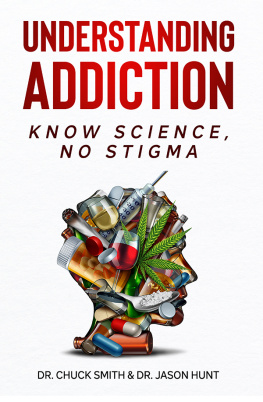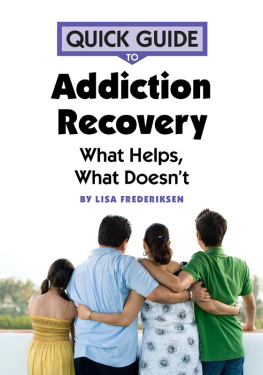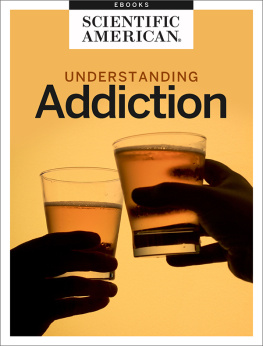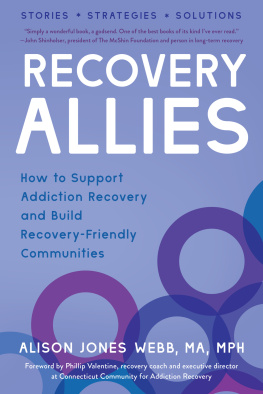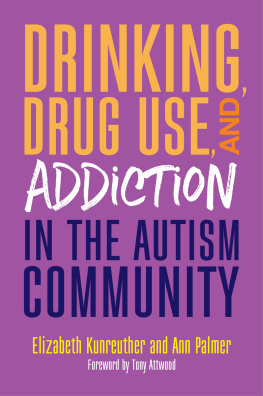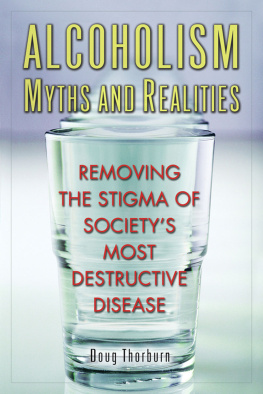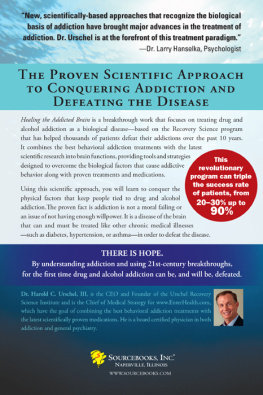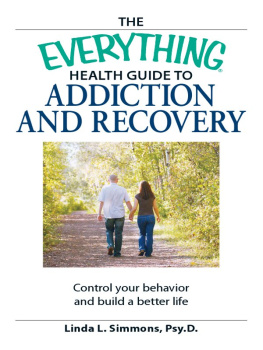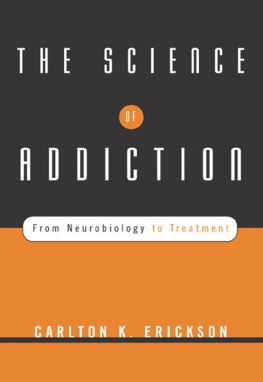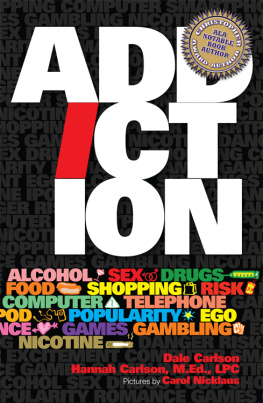Understanding Addiction
Know Science, No Stigma
Dr. Chuck Smith & Dr. Jason Hunt
F I R S T E D I T I O N
ISBN: 978-1-7372352-0-0
eBook ISBN: 978-1-7372352-1-7
Library of Congress Control Number: 2021909655
2021 Chuck Smith & Jason Hunt
All Rights Reserved
No part of this book may be reproduced or transmitted in any form or by any means without the written permission of the publisher.
Visualize Publishing
The content of this book is for informational purposes only and is not intended to diagnose, treat, cure, or prevent any condition or disease. This book is not intended as a substitute for consultation with a licensed practitioner. Please consult with your own physician or healthcare specialist regarding the suggestions and recommendations made herein. The publisher and authors are not responsible nor liable for any damages or negative consequences from any treatment, action, or application to any person reading or following the information in this book. Additionally, the publisher and the authors assume no responsibility for errors, inaccuracies, omissions, or any other inconsistencies herein.
To Mike McLemore and Dr. Scott Teitelbaum.
Thank you both for helping us get our careersand livesback on track.
Stigma is our biggest killer.
Jerome Adams ,
United States Surgeon General
CONTENTS
FOREWORD
Its an ugly illness. Unlike most other illnesses, substance use disorder is characterized predominantly by behavior. We see it most clearly in people who have harmed themselves or others, who have lost everything to their disease, who have been unable to stop the binges, who have seemingly refused to change their ways. We see it, in other words, by its outward effects. This is where the stigma comes from.
But nobody wants to harm themselves. Nobody sets out to destroy their family, lose their job, or hurt the ones they love. Underlying the behavior is the disease itself and its easy to forget this. Even amongst us professionals, its often hard to ignore, or excuse, the outward conduct. This is why there will always be some level of stigma. Weve made progress. Science has revealed to us much in the past few decades. But if a drunk driver plows into your car, and, God forbid, hurts you or someone you love, youre going to have a hard time forgiving that person. I would, too. Hence, the ugliness of the disease. All that the outside world sees is the behavior, which is often not pretty, and this is why this particular disease, unlike all others, is riddled so completely with shame and guilt and humiliation. And why its a particularly difficult disease to combat.
It is said what we should hate the sin and love the sinner. This seems especially relevant with substance use disorder. Most people who suffer with this disease are otherwise decent, kind, respectable human beings and consequently worthy of our attention and help. And worthy of a second chance. One was given to me almost a quarter of a century ago and I have tried to do the best I could with it. When two physicians came to me at the University of Florida several years ago, applying to our addiction medicine fellowship program, I decided to pay that chance forward.
Doctors Jason Hunt and Chuck Smith had been where I had once been: rock bottom. But in personal interviews with them, I quickly saw their desire to make something new of their lives. I saw sincerity. Since that time, in the course of their own work, I have seen dedication and devotion and passion. Most importantly, I have seen in both of them an unspoken commitment to never forget where they came from, to never forget the chain of events that preceded their extraordinary work in the field of addiction recovery.
If you or a loved one is suffering from substance use disorder, you could do a lot worse than listen to what these guys have to say. Youre worth a second chance, too. Within the pages of this book, you might just find it.
Scott A. Teitelbaum, M.D., D.F.S.A.M.
Gainesville, Florida
February, 2021
PREFACE
Did you know that you can go through four years of undergraduate work, four years of medical school, and several years of residency, and in all of that time never take a single class in addiction science?
If even doctorsthe people we trust our health toarent exposed to the particulars of this critical societal issue, how then is the layman supposed to make sense of it? The general population still thinks of addiction as a behavioral problem. They see it most commonly through the actions of addicted people, actions that sometimes cross the line into criminality. Hence, a person with a substance use disorder is treated like a criminal and not as a person suffering from a disease. And the fact that most doctors dont know any better isnt helping. The end result is that, as a society, we remain in a state of denial about the true nature of addiction.
The doctors who wrote this book do know better. I can say this, because I know them. I met Dr. Jason Hunt first, through Alcoholics Anonymous. I was in long-term recovery myself. I served as a combat medic for a special forces unit in Vietnam and I came home addicted to heroin. By the time I met Jason, I was the director of a residential halfway house. I saw something special in Jason. He had a certain quality that I believe is 99.9 percent of a persons recovery: the willingness to take responsibility for ones actions. Jason had come to grips with what hed done and who he was. He had no grand plans to get his medical license back and have a successful career as a doctor. That was the furthest thing from his mind in those days. All he wanted to do was put his life back together. And he was doing just thatsincerely, genuinely, and one day at a time. I helped him get certified as an addiction counselor and then hired him for the halfway house where he provided care for others trying to recover from their addictions. Later, I would testify on Jasons behalf when he had his hearing in front of the medical board to have his license restored. I couldnt have been prouder.
I met Dr. Chuck Smith through Jason. Chuck came to the halfway house and I saw the same promise in him that Id seen in Jason. I helped Chuck become certified in addiction counseling, too. And I was just as proud of him. Both have gone on to have exemplary careers in the field of addiction. Because of their experiences, because of their backgrounds, their careers have become so much more for them than mere occupations. Both these men have an uncommonly strong desire to make up for time lost to their substance use disorder, which, in turn, has given them a rare passion for their field.
They both have something to share and Im thrilled that they decided to write this book, an important entry into a field that could stand to have a lot more rational discussion, for doctor and layman alike. As Jason and Chuck might put it, much more knowledge is needed and way less stigma.
Mike McLemore,
Senior Pastor, Recovery Church of Huntsville, Alabama
Executive Director, Alabama Alcohol and Drug Abuse
Associations ICRC Board
Executive Director, McLemore Consulting LLC/Pathfinder,
Inc.
Huntsville, AL
May, 2021
INTRODUCTION
If youve picked this book up, congratulations. That means youre taking a step toward recovery, either for yourself, or for a loved one. We think youll be helped by the material herein.
As a quick disclaimer, however, it should be said up front that the content of this little book is probably not without some controversy. First of all, were both doctors, and there are some who believe that in any medical treatment its improper for a doctor to disclose to his patient his own experiences with the respective condition. It crosses a boundary. With problematic substance use in particular, theres a concern that disclosing ones own backstory borders on self-aggrandizement. Its an ego boost, a way for the storyteller to place himself as the hero in his own journey.
Next page
